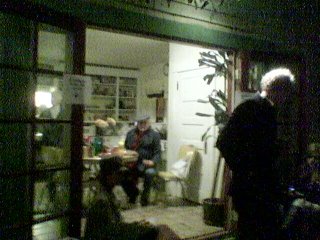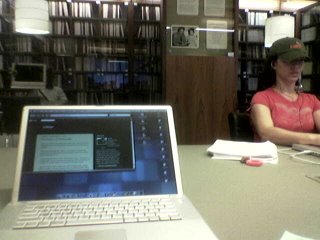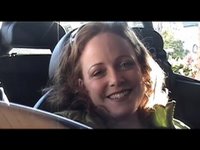"Theatre is like the long legged girl I used to be in love with but that still comes over to my house to kick me in the balls and steal all my money."
This is what the playwright, whom I'll call Robert (to protect the innocent as well as the guilty), says to me over lunch at Grub in LA.
"I know what you mean," I reply. "Only I'm still in love. And since she's already taken all my money, she now comes over with a blood bag and a needle to extract a pint or two to hock on the open market."
The first time our paths crossed was in San Francisco about a month before I headed to NY and Columbia. We were playing softball. When he discovered what I was about to do, he told me he was a playwright who'd been through the MFA mill himself. Between home runs (boy, could he smack a ball), he gave me one of the best pieces of advice I was to ever get about grad school and theatre.
"When I got out of school, I got out with all these friends from the program. I thought they'd just make my career automatically blossom. That doesn't happen. Well, maybe it happens for some people, but most people, that doesn't happen. Still, you'll have a great time. Especially if you're going there just to write. It's a lot of fun if that's what you're really interested in."
In NY, I discovered that Robert was not only correct about grad school, but a fairly successful playwright, a member of
New Dramatists, a gifted screenwriter and a writer on a television show or two that I happened to have a lot of respect for. He'd moved to the West Coast several years ago.
Now I wanted to find out about writing in Hollywood. And that included playwriting. Sort of.
"I've just found that the darker themes I'm interested in are more frankly handled in television and film than in theatre," he said.
Huh?
"Well, theatres seem to be interested in producing plays that are nice little unchallenging things. They want audiences to be comfortable. Television and film are actually less afraid."
I had to agree - or at least, let me say, my own experience suggested this was true. FIRE BABY, my dark comedy about generational problems that are played out when a kid tries to kill his parents (only half successfully - his mother proves to be quite a challenge to kill) had won a few awards but had been rejected everywhere. DRESSING THE GIRL, a story about our darker mental habits and prisms, had met the same fate. And almost every play I'd read for the Public that had some dark heart to it never made it much beyond a New Work NOW! consideration. Yet on TV, I could get THE SHIELD, THE WIRE, THE SOPRANOS, RESCUE ME, DEAD LIKE ME, ROME, FRIDAY NIGHT LIGHTS, BIG LOVE, SIX FEET UNDER, DEXTER, all the Aaron Sorkin shit and more. Hell, even the GILMORE GIRLS was occasionally more provocative than some of the programming at the major non-profits in NYC. And film, well, among all the blockbusters, you still had Aronofsky, Nolan, Gondry, Egoyan and Soderbergh working - to name a few.
"What do you want to break into? Television or film?" he asked.
"I've got a few movie scripts, but I thought I'd try my hand at television."
"Well, I think you'll find it easier if you go for one rather than both. There's really not as much cross over as people think."
I asked him to expand on that since he seemed to have actually avoided making a decision about which to do for himself.
"That's actually why I suggest making a decision. It's kind of hard to run between them. It's a lot."
Feeling like selling a screenplay was like winning the lottery, I told him I was probably going to pursue television pretty hard.
"I think being a staff writer on a television show is the best creative job in the world right now. You get paid well, the audience is there, the outlet is terrific and the quality of work is high. And nothing squeezes your brain harder. It's really amazing."
Any drawbacks?
"It's a great job for someone who's single, but it's not really for a family person. You work a lot. The hours can just be insane."
The bill came and we both produced credit cards. As we made out the tip amounts, I told him about the agent that had suggested making a film and putting it on YouTube.
"With technology being what it is, now anyone can make a thing. But unless they have access to some kind of cleverness that no-one else can get their hands on, I'm not sure there's anything to it."
I mentioned one of my favorite YouTube videos,
THE EASTER BUNNY HATES YOU. We both agreed it was funny, but not exactly the kind of sustained narrative that says, trust me, I can write your movie.
Still, making a movie. There had to be some value to it. Strangely, it brought us back to theatre.
"Sure. I made a movie a couple of years ago. It wasn't any good, but it made me remember what it was like to do theatre once. You work with a small group of people, very closely, very intensely and you really believe it's gonna be great so that you hardly notice that you're sitting around working with lights and actors in some hole at 3 o'clock in the morning. It was good to be in touch with that."
Yep, I knew exactly what he meant - after all, as I said at the top, I was still in love with that long legged girl.
Which is why, when we finished lunch, I went home, rolled up my sleeve and let her plunge that needle into my arm one more time: She needed that pint of blood much more than I did.
On her way out, she gave me a good knee to the groin.
I told her to come back tomorow morning. I was sure I'd have some more for her by then if she wanted.
******
Take a look at this on young audiences courtesy of the Playgoer. It's way worthwhile.
In 20 Years Everything You Love Will Be Dead
 Arrived in New York this morning - after a long redeye on JetBlue - for the week long Clubbed Thumb development of Beyond the Owing.
Arrived in New York this morning - after a long redeye on JetBlue - for the week long Clubbed Thumb development of Beyond the Owing.












